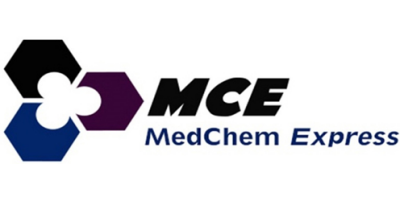

- Home
- Companies
- MedChemExpress LLC (MCE)
- Products
- MedChemExpress - Model WNK463 - ...
MedChemExpress - Model WNK463 - 2012607-27-9
WNK463 is an orally bioavailable pan-With-No-Lysine (K) (WNK)-kinase inhibitor with IC50s of 5 nM, 1 nM, 6 nM, and 9 nM for WNK1, WNK2, WNK3, and WNK4, respectively[1].MCE products for research use only. We do not sell to patients.
WNK463
MCE China:WNK463
Brand:MedChemExpress (MCE)
Cat. No.HY-100626
CAS:2012607-27-9
Purity:99.75%
Storage:Powder -20°C 3 years 4°C 2 years In solvent -80°C 6 months -20°C 1 month
Shipping:Room temperature in continental US; may vary elsewhere.
Description:WNK463 is an orally bioavailable pan-With-No-Lysine (K) (WNK)-kinase inhibitor with IC50s of 5 nM, 1 nM, 6 nM, and 9 nM for WNK1, WNK2, WNK3, and WNK4, respectively.
In Vitro:WNK463 (50 nM, 1 μΜ, 10 μΜ; 6 days; Human tissue-engineered corneas (hTECs)) treatment reduces phosphorylation of the WNK1 downstream targets SPAK/OSR1 in wounded hTECs[1].
In Vivo:WNK463 (1-10 mg/kg; oral administration; 4 hours; Spontaneously hypertensive Sprague Dawley rats) treatment produces dose-dependent decreases in blood pressure and simultaneous increases in heart rate in conscious SHRs. WNK463 produces significant and dose-dependent increases in urine output as well as urinary sodium and potassium excretion rates. WNK463 is orally bioavailable in Sprague Dawley rats with a half-life of 2.1 hours[1].
IC50 & Target:IC50: 5 nM (WNK1), 1 nM (WNK2), 6 nM (WNK3), and 9 nM (WNK4)[1] In Vitro WNK463 (50 nM, 1 μΜ, 10 μΜ; 6 days; Human tissue-engineered corneas (hTECs)) treatment reduces phosphorylation of the WNK1 downstream targets SPAK/OSR1 in wounded hTECs[1]. MedChemExpress (MCE) has not independently confirmed the accuracy of these methods. They are for reference only. 0 --> WNK463 Related Antibodies Western Blot Analysis[2] Cell Line: Human tissue-engineered corneas (hTECs)
Hot selling product:AR7 | Belimumab | Luteolin 7-diglucuronide | SR1078 | Oleoylethanolamide | Sulfo-SMCC (sodium) | Hesperetin | 5β-Cholanic acid | Latanoprost | Carbidopa
Trending products:Recombinant Proteins | Bioactive Screening Libraries | Natural Products | Fluorescent Dye | PROTAC | Isotope-Labeled Compounds | Oligonucleotides
References:
[1]. Yamada K et al. Small-molecule WNK inhibition regulates cardiovascular and renal function. Nat Chem Biol. 2016 Nov;12(11):896-898. [Content Brief]
[2]. Desjardins P, et al. Contribution of the WNK1 kinase to corneal wound healing using the tissue-engineered human cornea as an in vitro model. J Tissue Eng Regen Med. 2019 Sep;13(9):1595-1608. [Content Brief]
Brand introduction:
• MCE (MedChemExpress) has a global exclusive compound library of more than 200 kinds, and we are committed to providing the most comprehensive range of high-quality small molecule active compounds for scientific research customers around the world;
• More than 50,000 highly selective inhibitors and agonists are involved in various popular signaling pathways and disease areas;
• The products cover a variety of recombinant proteins, peptides, commonly used kits, more PROTAC, ADC and other characteristic products, widely used in new drug research and development, life science and other scientific research projects;
• Provide virtual screening, ion channel screening, metabolomics analysis detection analysis, drug screening and other professional technical services;
• It has a professional experimental center and strict quality control and verification system;
• Provide LC/MS, NMR, HPLC, chiral analysis, elemental analysis and other quality inspection reports to ensure the high purity and high quality of products;
• The biological activity of the products has been verified by the experiments of customers in various countries;
• A variety of top journals such as Nature, Cell, Science and pharmaceutical patents have included the scientific research results of MCE customers;
• Our professional team tracks the latest pharmaceutical and life science research and provides you with the latest active compounds in the world;
• It has established long-term cooperation with the world's major pharmaceutical companies and well-known scientific research institutions。
